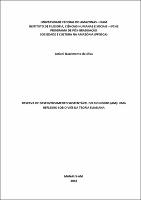| ???jsp.display-item.social.title??? |


|
Please use this identifier to cite or link to this item:
https://tede.ufam.edu.br/handle/tede/6951| ???metadata.dc.type???: | Dissertação |
| Title: | Reserva de Desenvolvimento Sustentável do Rio Negro (AM): uma reflexão sob o viés da teoria eliasiana |
| ???metadata.dc.creator???: | Silva, Josiani Nascimento da  |
| ???metadata.dc.contributor.advisor1???: | Ribeiro, Odenei de Souza |
| ???metadata.dc.contributor.referee1???: | Matos, Gláucio Campos Gomes |
| ???metadata.dc.contributor.referee2???: | Ponciano, Nilton Paulo |
| ???metadata.dc.description.resumo???: | A ação humana em busca do desenvolvimento econômico vem gerando uma série de modificações no ambiente natural. Isso vem causando um desequilíbrio ambiental há nível global, o que acabou estimulando a criação das Unidades de Conservação como reflexo dos compromissos internacionais assumidos em 1972, na Conferência das Nações Unidas sobre Meio Ambiente, em Estocolmo, que difundiu os resultados da reunião do Clube de Roma e do Relatório Meadows, denominado “Os limites do crescimento” . Na Amazônia não foi diferente por se tratar da maior floresta tropical do mundo e possuir uma fantástica diversidade biológica e cultural. No entanto, sabe-se que além de milhares de espécies animais e vegetais, muitas delas ainda não identificadas pela ciência, nessas áreas também vivem povos indígenas, grupos remanescentes de quilombos, comunidades de seringueiros, castanheiros, comunidades tradicionais ribeirinhas, entre outros. Neste sentido a pesquisa tem como objeto as transformações ocorridas na comunidade ribeirinha Tumbira com a criação da RDS do Rio Negro embasando-se na teoria eliasiana que tem como ponto de partida o conceito de configuração social, no qual Elias defende que a sociedade se forma a partir das relações sociais, ou seja, por indivíduos interdependentes, indivíduos diferentes. Trata-se de processos que de fato se diferenciam, mas não são indissociáveis. A pesquisa realizará inicialmente a partir de documentos bibliográficos, pois buscará aprofundamento em materiais já existentes como livros, artigos científicos, dissertações de mestrado e teses de doutorado para conhecer melhor o objeto de estudo. Optou-se por realizar nesse trabalho de campo de caráter quali-quantitativo uma pesquisa exploratória / descritiva, com o intuito de obter informações sobre os processos socioculturais na comunidade Tumbira, ocorridos com intervenção do Estado no cotidiano dos comunitários a fim conservar o ecossistema natural. |
| Abstract: | Human action in search of economic development has generated a series of changes in the natural environment. This has caused a global environmental imbalance, which has stimulated the creation of Conservation Units as a reflection of the international commitments made in 1972 at the United Nations Conference on the Environment in Stockholm, which disseminated the results of the Rome and the Meadows Report, entitled "The Limits of Growth". In the Amazon was no different because it is the largest tropical forest in the world and has a fantastic biological and cultural diversity. However, it is known that in addition to thousands of animal and plant species, many of them as yet unidentified by science, indigenous peoples, remaining groups of quilombos, communities of rubber tappers, chestnut trees, traditional riverside communities, among others also live in these areas. In this sense, the research has as its object the transformations that took place in the Tumbira riverside community with the creation of the RDS of Rio Negro based on the Eliasian theory that has as its starting point the concept of social configuration, in which Elias defends that society is formed to from social relations, that is, by interdependent individuals, different individuals. These are processes that in fact differ but are not inseparable. The research will be carried out initially from bibliographic documents, as it will seek to deepen existing materials such as books, scientific articles, master's dissertations and doctoral theses to better understand the object of study. It was decided to carry out an exploratory / descriptive research in this qualitative and quantitative field, with the aim of obtaining information about the socio-cultural processes in the Tumbira community, which occurred with the intervention of the State in the daily life of the community in order to conserve the natural ecosystem. |
| Keywords: | Unidade de conservação Processo civilizador Turismo Comunidade Figuração |
| ???metadata.dc.subject.cnpq???: | CIÊNCIAS HUMANAS |
| Language: | por |
| ???metadata.dc.publisher.country???: | Brasil |
| Publisher: | Universidade Federal do Amazonas |
| ???metadata.dc.publisher.initials???: | UFAM |
| ???metadata.dc.publisher.department???: | Instituto de Filosofia, Ciências Humanas e Sociais |
| ???metadata.dc.publisher.program???: | Programa de Pós-graduação em Sociedade e Cultura na Amazônia |
| Citation: | SILVA, Josiani Nascimento da. Reserva de Desenvolvimento Sustentável do Rio Negro (AM): uma reflexão sob o viés da teoria eliasiana. 2018. 121 f. Dissertação (Mestrado em Sociedade e Cultura na Amazônia) - Instituto de Filosofia, Ciências Humanas e Sociais, Universidade Federal do Amazonas, Manaus, 2018. |
| ???metadata.dc.rights???: | Acesso Aberto |
| URI: | https://tede.ufam.edu.br/handle/tede/6951 |
| Issue Date: | 5-Jul-2018 |
| Appears in Collections: | Mestrado em Sociedade e Cultura na Amazônia |
Files in This Item:
| File | Description | Size | Format | |
|---|---|---|---|---|
| Dissertação_JosianiSilva_PPGSCA.pdf | 6.82 MB | Adobe PDF |  Download/Open Preview |
Items in DSpace are protected by copyright, with all rights reserved, unless otherwise indicated.




